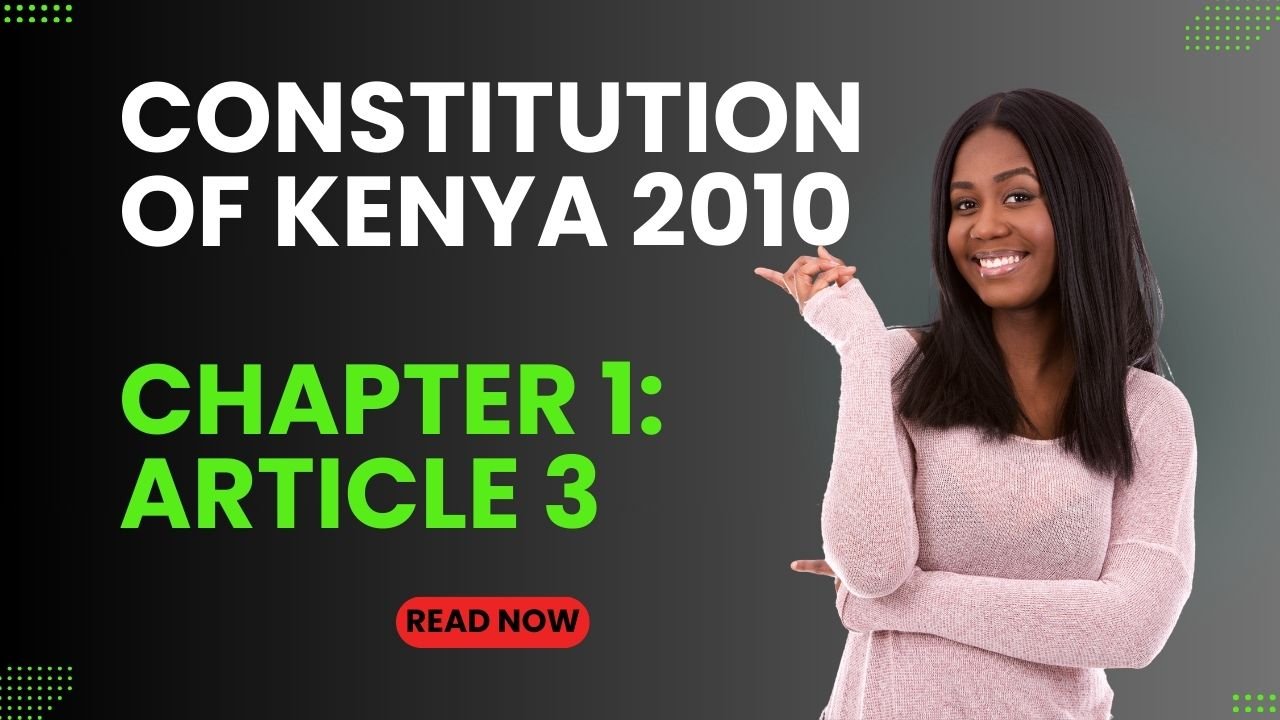Constitution of Kenya Chapter 1 Article 3

Protecting the Cornerstone: The Defense of the Constitution
Have you ever wondered who is responsible for protecting Kenya’s most important legal document—the Constitution? Is it only the duty of the government, or does every citizen play a role?
In Kenya, the responsibility falls on all of us.
Article 3 of the Constitution makes it clear that defending the Constitution is not just for leaders—it’s a duty for every Kenyan, it’s a collective duty.
Here is what it says…
Chapter 1 Article 3.
(1) Every person has an obligation to respect, uphold and defend this Constitution.
(2) Any attempt to establish a government otherwise than in compliance with this Constitution is unlawful.
Understanding Chapter 1, Article 3 of the Kenyan Constitution
Article 3(1): Obligation to Defend the Constitution
This section makes it the duty of every Kenyan citizen to uphold and defend the Constitution. It means that all Kenyans—whether a government official, an ordinary citizen, or a member of the armed forces, are responsible for ensuring the Constitution is respected.
Article 3(2): Consequences of Attempting to Establish a Government Contrary to the Constitution
This clause makes it illegal to attempt to establish a government outside the boundaries of the Constitution. Actions such as coups or other unlawful methods of taking power are invalid and considered unacceptable under Kenyan law.
Key Takeaways:
- Attempts to establish authority outside the Constitution will not be tolerated because they undermine democracy.
- The Constitution is clear: any government must be formed according to its rules and principles.
Quiz Time: Test Your Knowledge!
1. Who is responsible for defending the Constitution according to Article 3(1)?
- a) The President
- b) Parliament
- c) Every Kenyan citizen
- d) The Judiciary
Correct Answer: (C)
2. What is the main duty of Kenyan citizens under Article 3(1)?
- a) To pay taxes regularly
- b) To uphold and defend the Constitution
- c) To follow government orders without question
- d) To participate in elections
Correct Answer: (B)
3. What happens if someone tries to establish a government contrary to the Constitution, as stated in Article 3(2)?
- a) It is considered a valid government if supported by the military.
- b) It is allowed if Parliament approves it.
- c) It is deemed illegal and invalid.
- d) It requires a public vote to confirm.
Correct Answer: (C)
4. Article 3(2) applies to attempts to form a government in what manner?
- a) By following the election laws of the Constitution
- b) Through unconstitutional means
- c) By appointment of the Judiciary
- d) Through public consensus only
Correct Answer: (B)
Did You Know?
There have been no amendments made to Chapter 1, Article 3 of the Constitution of Kenya, 2010.
This means that the core principles of the people’s sovereignty and how it is exercised through the three arms of government, (at the national and devolved county levels) continues to be a cornerstone of Kenya’s constitutional order.
Quotable Quote
Democracy is not a spectator sport. You either participate or let others decide your future.
-Eleanor Roosevelt
Recommended links to learn more;
- The National Council for the Implementation of the Constitution :https://cohesion.go.ke/
- The Kenya Human Rights Commission: https://khrc.or.ke/
Finally…
Chapter 1, Article 3 of the Constitution of Kenya is a powerful reminder that protecting democracy and upholding the rule of law is a shared responsibility. It ensures that the Constitution remains Kenya’s guiding principle and protects the nation from unconstitutional actions.
As Kenyans, our duty is clear: respect, uphold, and defend the Constitution for the rights and freedoms of current and future generations.
Connect with us on Twitter(X) and Youtube for further discussions about governance of Kenya.
Have a safe week and thanks for reading!
The Civic Scoop Team





some really interesting points you have written.
I don’t think the title of your article matches the content lol. Just kidding, mainly because I had some doubts after reading the article. https://www.binance.info/da-DK/register?ref=V3MG69RO
Your point of view caught my eye and was very interesting. Thanks. I have a question for you.
Hey, just tried Yonorummy51bonus! Honestly, pretty solid Rummy platform. The 51 bonus is a nice little boost to get you started. Good selection of games too, definitely worth checking out! Get yours here: yonorummy51bonus
Your point of view caught my eye and was very interesting. Thanks. I have a question for you. https://www.binance.com/sk/register?ref=WKAGBF7Y
Thank you for your sharing. I am worried that I lack creative ideas. It is your article that makes me full of hope. Thank you. But, I have a question, can you help me?
Your article helped me a lot, is there any more related content? Thanks! https://accounts.binance.info/en/register?ref=JHQQKNKN
I don’t think the title of your article matches the content lol. Just kidding, mainly because I had some doubts after reading the article. https://www.binance.com/es-AR/register?ref=UT2YTZSU
Your article helped me a lot, is there any more related content? Thanks!
Just gave 277bet1 a whirl and I gotta say, it’s pretty decent! The site’s easy to navigate, which is always a plus. Definitely worth checking out if you’re looking for some fun. Check it out here: 277bet1
Yo, UG777login is my go-to spot! Been having some good luck lately. Easy to navigate and the support is actually helpful. Definitely worth checking out! ug777login knows what’s up.
Thanks for sharing. I read many of your blog posts, cool, your blog is very good.
Betaobetbr has some pretty cool stuff going on. Found some new favorite games there so far, and the promos are pretty sweet. Give it a whirl. betaobetbr
Thanks for sharing. I read many of your blog posts, cool, your blog is very good. https://accounts.binance.com/si-LK/register?ref=LBF8F65G
Thanks for sharing. I read many of your blog posts, cool, your blog is very good.
F*ckin¦ awesome things here. I¦m very glad to see your article. Thank you a lot and i am having a look forward to touch you. Will you kindly drop me a e-mail?
I don’t think the title of your article matches the content lol. Just kidding, mainly because I had some doubts after reading the article. https://www.binance.info/bg/register?ref=V2H9AFPY
okiebet https://www.okokiebet.com
WJ2 Philippines Online Casino: Best Slot Games, Easy WJ2 Login, Register & App Download. Experience the best wj2 slot games at WJ2 Philippines Online Casino. Enjoy easy wj2 login, wj2 register, and fast wj2 app download. Join the top wj2 casino online and start winning today! visit: wj2
Can you be more specific about the content of your article? After reading it, I still have some doubts. Hope you can help me. https://accounts.binance.info/ru-UA/register-person?ref=JVDCDCK4
joker slot 888 v1 không ngừng nỗ lực để mang lại những trải nghiệm cá nhân hóa sâu sắc cho từng phân khúc khách hàng. Từ giao diện đồ họa sang trọng đến hệ thống âm thanh sống động, tất cả đều được tinh chỉnh nhằm mang lại sự hài lòng tuyệt đối cho người chơi. TONY02-03H
Your point of view caught my eye and was very interesting. Thanks. I have a question for you. https://accounts.binance.info/da-DK/register-person?ref=V3MG69RO
I don’t think the title of your article matches the content lol. Just kidding, mainly because I had some doubts after reading the article.
[9208]789casino Philippines: Register & Login via the Official Link. Download the 789casino App for the Best Slots & Online Casino Games! Join 789casino Philippines! Use the official link for easy 789casino login and register. Download the 789casino app to play top 789casino slots and win big today! visit: 789casino
Your point of view caught my eye and was very interesting. Thanks. I have a question for you. https://accounts.binance.com/ar-BH/register?ref=S5H7X3LP
Your point of view caught my eye and was very interesting. Thanks. I have a question for you.
Pak Aviator Game is pretty cool, I gotta say. Simple to pick up, but can get intense! If you like that kinda game, hit up pakaviatorgame.
Alright, MCW678com, tell me what’s the deal here? Good bonuses? Fast payouts? ‘Cause I ain’t got time for no shady business. mcw678com
Heard about swrte99 from a mate, decided to give it a burl. Not bad, not bad at all! Lots of games to keep ya busy. Check it out swrte99.
Your point of view caught my eye and was very interesting. Thanks. I have a question for you.
Thanks for sharing. I read many of your blog posts, cool, your blog is very good.
Can you be more specific about the content of your article? After reading it, I still have some doubts. Hope you can help me.
I don’t think the title of your article matches the content lol. Just kidding, mainly because I had some doubts after reading the article.
Found some awesome links on 56winlink the other day. The site’s updated regularly, so keep an eye out for new promos!
Quick and easy game downloads from n7gamedownload! No dodgy redirects or anything. Solid site.
Heard whispers about 9kbossgame. Graphics are sharp, gameplay is interesting. Feels like it’s got potential. Maybe you’ll become the boss! Give 9kbossgame a shot and let me know what you think.